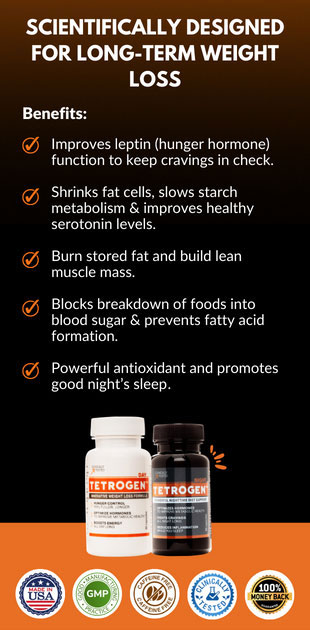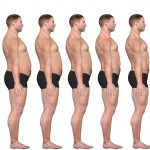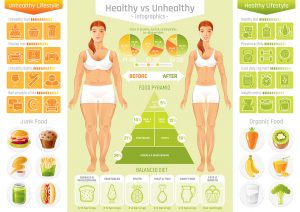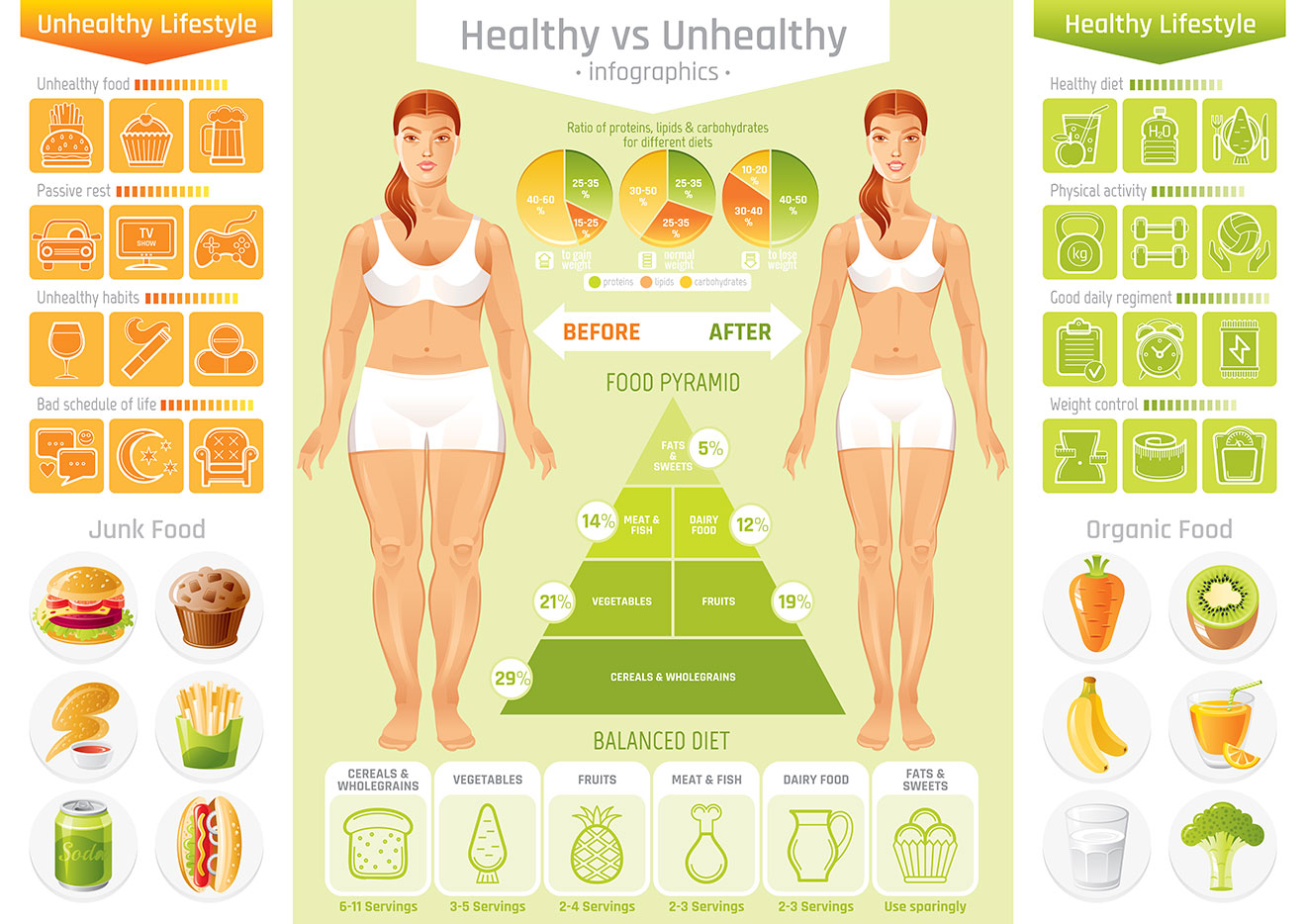
Should You Diet or Exercise to Lose Weight and Keep It Off?

There’s a lot of advice about how to lose weight. The most basic advice may, of course, simply be “Eat less, move more.” There’s also “You can’t out-exercise a bad diet.” And a new common YouTube ad even suggests you stop exercising altogether if you want to lose weight. (What?!) So, it makes sense that so many people are asking should I diet or exercise to lose weight?
It’s a fact that cutting calories has been shown to promote greater weight loss than increasing exercise. And you also can’t out-exercise a bad diet. If you sit down and eat a full medium-size pepperoni pizza by yourself, you’ll consume nearly 2,000 calories. To burn that off, you would have to run on a treadmill (at 6 mph set to a 4-degree incline) for around 3.5 to 4 hours. That’s not exactly realistic. But it’s also probably not all that likely you can sit down and eat a full pepperoni pizza in one sitting.
Most people do find that it’s easier to adjust the calories they consume than it to burn more calories through increased exercise. To cut the story short then, it’s more effective to lose weight by cutting calories via changing your diet. So, that must mean that when it comes to diet or exercise to lose weight, the answer is “diet,” right?
Issues with Diet-Only Approach to Weight Loss

Not so fast! If you lose weight quickly due to crash dieting or cutting calories too drastically, you’re also more likely to quickly regain that weight. To put it another way, exercise helps maintain the weight lost over the long term.
This is because with diet alone, you only lose a portion of weight from fat. You also lose muscle and bone density, which decreases metabolism. Exercising also triggers the growth of metabolic tissues (including muscle cells), which allows you to burn mostly fat while maintaining muscle and bone.
The number on the scale may not move as much, but the other signs of weight loss (like how your clothes fit and how your size and shape change) will likely be drastically more impressive when you use exercise to lose weight.
Thus, the simple answer to “Should I Diet or Exercise to Lose Weight?” is both. 1
Weight Loss Benefits of a Healthy Diet Plan
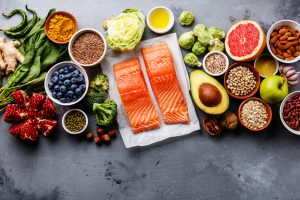
Many experts like Shawn Talbott, PhD, of the University of Utah Nutrition Clinic, will tell you that weight loss is 75% to 80% diet and just 20% to 25% exercise. However, at least short term, results are most pronounced when they change their diet. 2 For example, according to Talbott, some research has found that people who dieted but didn’t exercise lost 23 pounds over 15 weeks. Exercisers, on the other hand, people lost only 6 pound over 21 weeks.
While low-carb and keto diets are all the rage (and can lead to really quick results for some people), the focus should be on a diet plan you can stick to for the long term. Strive to eat protein and vegetables with every meal, and then add in whole-food carbs like sweet potatoes, brown rice, and oatmeal along with fruit to help sustain energy levels and provide filling fiber.
Another key is to cut enough calories to lose weight but avoid cutting calories too much, which can slow metabolism and cause you to lose calorie-burning muscle mass. It takes a calorie deficit of right around 3,500 to lose a single pound, and a healthy weight-loss plan allows you to lose between one and two pounds a week. Using the 80/20 formula above, to achieve this, you could cut the calories you take in by 2,800 over the week (or by about 400 calories a day). Plus, you would need to burn an extra 700 calories via exercise per week. (You can do this just by taking 30-minute walks 5 days a week.)
Examples of Healthy Diet for Weight Loss
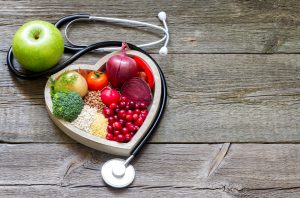
Fortunately, by changing what you eat, you can eat more food while still eating less calories. It’s all about choosing whole foods that are nutrient dense yet calorie sparse like:
- Vegetables, especially green leafy vegetables and cruciferous vegetables
- Fiber-rich fruits like berries, apples, and citrus
- Whole grains like brown rice, quinoa, oatmeal, and ancient grains
- Filling starchy vegetables like potatoes, sweet potatoes, and corn
- Protein-rich meats like fish and seafood, bison, grass-fed and free-range beef, and organic poultry
- Legumes and beans
- Organic dairy foods
- Nuts and seeds
Weight-Loss Benefits of Balanced Exercise Plan

To get the results from your exercise plan, you don’t have to spend hours on the treadmill, train for a triathlon, or run marathons. Just build up to exercising for about 30 minutes to an hour 5 to 6 times per week at a moderate pace.
For the best results, combine resistance or weight training with cardio activities like brisk walking or jogging or an aerobic dance class like Zumba 3 to 5 days a week. For your weight training, the majority of the workout should be made up of more compound exercises like squats, lunges, deadlifts, bench press, push-ups, and pull ups rounded out with some isolation exercises like biceps curls, triceps pushdowns, lateral raises, hamstring curls, and leg extensions for overall balance twice a week. And don’t forget to stretch for at least a few minutes daily.
Exercise provides numerous other benefits like:
- Improved brain functioning, 3 mood, 4 and creativity 5
- Better blood sugar management as well as optimized insulin and leptin sensitivity 6
- Improved energy levels 7
- Increased strength and muscle size 8
- Improved metabolic rate (as well as an afterburn that keeps you burning calories for longer after some types of exercise) 9
- Shrinking fat cells as the body gets better at burning fat 10
- Greater ease in everyday activities and improved quality of life
- Improved overall fitness 11
- Better sleep 12
- Improved wound healing 13
- Improved heart health 14
- Slowed aging 15 and increased health span by up to 10 years 16
- Decreased risk of early death by 24% with low-intensity activity and up to 77% with 30 minutes per day of moderate to intense exercise 17
- Stronger bones
- Money saved—people who exercise save around $2,500 or more a year on medical costs and are less likely to develop arthritis, type 2 diabetes, and even certain types of cancer. 18
Just be aware that exercise accounts for only a small faction of the calories you burn throughout the day. Most calories are burned by the basal metabolic rate or the energy burned while at rest. This accounts for up to 80% of energy expenditure. You also burn calories to break down food (which burns about 10% of the calories you consume—e.g., 10 calories are burned just to digest and absorb 100 calories). You also burn excess calories through non-exercise activity thermogenesis or NEAT. So, exercise itself only burns somewhere around 10% to 30% of the calories you use.
How to Balance Diet and Exercise to Lose Weight

Now you know that you can’t erase all of your dietary transgressions with a trip to the gym. Yet exercise is a key to remaining healthy as well as maintaining your weight loss. The question remains: how can you best balance diet and exercise to lose weight?
As mentioned above, the calculation is 75% to 80% diet and 20% to 25% exercise. Both are vital to a healthy, strong, trim body. Yet when losing weight, the focus has to be on ensuring you’re consuming the right amount of healthy foods, emphasizing better food choices, while reducing calories.
Fortunately, increased exercise levels can help improve diet too. Some research has found exercise decreased food cravings. 19 Other research from the University of Texas at Austin found that when participants in the study started exercising, they were more likely to choose healthier foods like lean meats, vegetables, and fruits. Plus, they found their preference for fried foods, sodas, and other unhealthier options was lower. 20
In one review study, the researchers found that diet combined with exercise led to 20% more initial weight loss as well as a 20% great chance of maintaining that weight loss. 21
The Best Time to Eat and Exercise to Lose Weight

Can when you eat and exercise help you lose weight? And if so, what’s the best time to eat and exercise to lose weight?
There is growing evidence that weight gain (and loss) is related to meal times. How you time your day does indeed have an effect on your weight loss. Eating at consistent times during the day (say, having breakfast between 8:00 and 8:30 every day vs. 8:00 one morning and 10:30 the next), for example, can help you lose weight. This is because eating and circadian rhythms are deeply connected. 28, 30 Surprisingly, deviating from the usual time you eat can increase blood sugar levels by up to 18% over normal. In addition, erratic meal patterns are linked to increased risk of metabolic syndrome (i.e., high blood pressure, type 2 diabetes, and obesity). 22
Intermittent fasting notwithstanding, it’s also been found that when the first meal you eat during the day contains more calories than those eaten for dinner, individuals lose significantly more weight. 23 In addition, if weight loss is the goal, a high-protein breakfast appears to be more effective than a high-carb breakfast as it helps you feel less hungry throughout the rest of the day.
If you’ve had a busy day, you may notice that lunch gets pushed until later. Other research has found that this isn’t a good habit to get into. Folks who eat the majority of their calories before 3:00 p.m. lost more weight than those who pushed their lunch to later and ended up eating their main meal after 3:00 p.m. 24, 29
The Big 3 of Diet and Exercise to Lose Weight
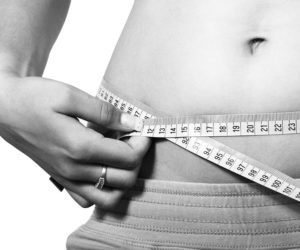
So, if your goal is to lose weight and keep it off, then there are three considerations:
The total calories consumed per day. The quality of the calories you consume (i.e., eating whole, nutrient-dense foods over processed junk food). When you eat—ensuring that most of your calories are consumed earlier in the day rather than later and finish eating a few hours before you go to bed so you don’t interfere with your bodily hormones, which can lead to digestive issues, overeating, and weight gain.
What about exercise? Should you work out in the morning or the evening? The most important time to exercise is when you will. That is, if you’re a morning person and you bound out of bed to move your body, do that. If you have a co-worker who holds you accountable to work out over lunch daily, then pick then. If you find that exercising in the evening after work helps you let go of the stress of the day, then use that time. Squeeze your exercise into your day whenever you can!
That said, if you are looking to optimize your workouts, then when you exercise can make a bit of a difference. For example, those folks who exercise first thing in the morning on an empty stomach appear to burn more stored fat. Plus, working out in the morning tends to lead you to have a lower appetite the rest of the day. 19
Science Backs A Balanced Approach to Diet and Exercise
One study found that people who exercised at 7:00 a.m. experienced a body clock shift, so they enjoyed more energy and alertness in the morning, got tired earlier in the evening, and enjoyed better rest at night. 25, 26 What’s more, some research suggests that those who work out in the morning are more likely to stick to the exercise habit, improve productivity throughout the day, and enjoy a better mood.
What if you aren’t a morning person? Don’t sweat it. Afternoon workouts are almost as good, just in a different way. For example, because you’ve already got some fuel on board (from breakfast or lunch), you likely enjoy a boost in exercise performance leading to better results. Working out in the afternoon can also help you avoid the typical afternoon slump. Even a short afternoon walk can help increase focus and alertness to help you get through the rest of the day.
What if evening is the only time you can fit it in (or that’s just when you prefer to exercise)? That’s great too. Many people are afraid that an evening workout will disrupt a good night’s sleep. But research has found that this isn’t the case. Plus, the evening workouts also set people up for weight loss as they reduced levels of the hunger hormone ghrelin.” 26
So, while morning workouts may have a slight edge as the best time to work out, there’s really no bad time to exercise.
Diet or Exercise to Lose Weight Conclusion
If you’re still looking for an either or choice (i.e., either exercise or diet), consider this: One study from the University of Colorado followed 10,000 American who lost weight and kept it off. Only 1% were able to keep the pounds off with exercise alone; 10% did it with diet alone. Yet a full 89% used diet and exercise combined. 27 Diet and exercise are the dynamic duo for success… and if you add quality supplementation to help your body adapt even more rapidly, you can find the ultimate solution to not just lose weight but to keep it off, which is really the long-term goal.
References:
1: Klem ML, Wing RR, McGuire MT, Seagle HM, Hill JO. A descriptive study of individuals successful at long-term maintenance of substantial weight loss. The American Journal of Clinical Nutrition. 1997 Aug 1;66(2):239-46.
2: Wexler S. Exercise Vs. Diet: The truth about weight loss [Internet]. Huffingtonpost.com. 2014 [cited 26 June 2020].
Available from: Exercise Vs. Diet: The Truth About Weight Loss – HuffPost
3: Cotman CW, Engesser-Cesar C. Exercise enhances and protects brain function. Exercise and Sport Sciences Reviews. 2002 Apr 1;30(2):75-9.
4: Anderson EH, Shivakumar G. Effects of exercise and physical activity on anxiety – PubMed. Frontiers in Psychiatry. 2013 Apr 23;4:27.
Additional References
5: Steinberg H, Sykes EA, Moss T, Lowery S, LeBoutillier N, Dewey A. Exercise enhances creativity independently of mood. British Journal of Sports Medicine. 1997 Sep 1;31(3):240-5.
6: Derouich M, Boutayeb A. The effect of physical exercise on the dynamics of glucose and insulin – ScienceDirect. Journal of Biomechanics. 2002 Jul 1;35(7):911-7.
7: Loy BD, O’Connor PJ, Dishman RK. The effect of a single bout of exercise on energy and fatigue states: A systematic review and meta-analysis. Fatigue: Biomedicine, Health & Behavior. 2013 Oct 1;1(4):223-42.
8: Tipton K, Wolfe RR. Exercise, protein metabolism, and muscle growth – PubMed. International Journal of Sport Nutrition and Exercise Metabolism. 2001;11(1):109-32.
Additional References
9: Gilliat-Wimberly M, Manore MM, Woolf K, D SWAN PA, Carroll SS. Effects of habitual physical activity on the resting metabolic rates and body compositions of women aged 35 to 50 years – PubMed. Journal of the American Dietetic Association. 2001 Oct 1;101(10):1181-8.
10: Mika A, Macaluso F, Barone R, Di Felice V, Sledzinski T. Effect of exercise on fatty acid metabolism and adipokine secretion in adipose tissue. Frontiers in Physiology. 2019 Jan 28;10:26.
11: Menshikova EV, Ritov VB, Fairfull L, Ferrell RE, Kelley DE, Goodpaster BH. Effects of exercise on mitochondrial content and function in aging human skeletal muscle. The Journals of Gerontology Series A: Biological Sciences and Medical Sciences. 2006 Jun 1;61(6):534-40.
12: Loprinzi PD, Cardinal BJ. Association between objectively-measured physical activity and sleep, NHANES 2005–2006 – ScienceDirect. Mental Health and Physical Activity. 2011 Dec 1;4(2):65-9.
Additional References
13: Emery CF, Kiecolt-Glaser JK, Glaser R, Malarkey WB, Frid DJ. Exercise accelerates wound healing among healthy older adults: A preliminary investigation. The Journals of Gerontology Series A: Biological Sciences and Medical Sciences. 2005 Nov 1;60(11):1432-6.
14: Fletcher GF, Balady G, Blair SN, Blumenthal J, Caspersen C, Chaitman B, Epstein S, Froelicher ES, Froelicher VF, Pina IL, Pollock ML. Statement on exercise: benefits and recommendations for physical activity programs for all Americans: A statement for health professionals by the Committee on Exercise and Cardiac Rehabilitation of the Council on Clinical Cardiology, American Heart Association. Circulation. 1996 Aug 15;94(4):857-62.
http://www.pilarmartinescudero.es/pdf/lecturasentrenamiento/beneficiosyrecomencaciones_af_todos.pdf/
15: Koltai E, Hart N, Taylor AW, Goto S, Ngo JK, Davies KJ, Radak Z. Age-associated declines in mitochondrial biogenesis and protein quality control factors are minimized by exercise training – PubMed. American Journal of Physiology-Regulatory, Integrative and Comparative Physiology. 2012 Jul 15;303(2):R127-34.
Additional References
16: Li Y, Pan A, Wang DD, Liu X, Dhana K, Franco OH, Kaptoge S, Di Angelantonio E, Stampfer M, Willett WC, Hu FB. Impact of healthy lifestyle factors on life expectancies in the US population. Circulation. 2018 Jul 24;138(4):345-55.
17: Dohrn M, Kwak L, Oja P, Sjöström M, Hagströmer M. Replacing sedentary time with physical activity: A 15-year follow-up of mortality in a national cohort. Clinical Epidemiology. 2018;10:179.
Everyday exercise has surprisingly positive health benefits
18: Ntanasis-Stathopoulos J, Tzanninis JG, Philippou A, Koutsilieris M. Epigenetic regulation on gene expression induced by physical exercise. J Musculoskelet Neuronal Interact. 2013 Jun 1;13(2):133-46.
Additional References
19: Hollingshead T. BYU study says exercise may reduce motivation for food [Internet]. News. 2012 [cited 26 June 2020].
20: Joo J, Williamson SA, Vazquez AI, Fernandez JR, Bray MS. The influence of 15-week exercise training on dietary patterns among young adults. International Journal of Obesity. 2019 Sep;43(9):1681-90.
Want healthier eating habits? Start with a workout
21: Curioni CC, Lourenco PM. Long-term weight loss after diet and exercise: A systematic review. International Journal of Obesity. 2005 Oct;29(10):1168-74.
Additional References
22: Pot GK, Almoosawi S, Stephen AM. Meal irregularity and cardiometabolic consequences: Results from observational and intervention studies. Proceedings of the Nutrition Society. 2016 Nov;75(4):475-86.
23: Jakubowicz D, Barnea M, Wainstein J, Froy O. High caloric intake at breakfast vs. dinner differentially influences weight loss of overweight and obese women. Obesity. 2013 Dec;21(12):2504-12.
24: Garaulet M, Gómez-Abellán P. Timing of food intake and obesity: A novel association. Physiology & Behavior. 2014 Jul 1;134:44-50.
Additional References
25: Youngstedt SD, Elliott JA, Kripke DF. Human circadian phase–response curves for exercise. The Journal of Physiology. 2019 Apr;597(8):2253-68.
26: Larsen P, Marino F, Melehan K, Guelfi KJ, Duffield R, Skein M. Evening high‐intensity interval exercise does not disrupt sleep or alter energy intake despite changes in acylated ghrelin in middle‐aged men. Experimental Physiology. 2019 Jun;104(6):826-36.
27: McGuire MT, Wing RR, Klem ML, Hillf JO. Behavioral strategies of individuals who have maintained long‐term weight losses. Obesity Research. 1999 Jul;7(4):334-41.
Additional References
28: Almoosawi S, Vingeliene S, Karagounis LG, Pot GK. Chrono-nutrition: a review of current evidence from observational studies on global trends in time-of-day of energy intake and its association with obesity. Proceedings of the Nutrition Society. 2016 Nov;75(4):487-500.
29: Garaulet M, Gómez-Abellán P, Alburquerque-Béjar JJ, Lee YC, Ordovás JM, Scheer FA. Timing of food intake predicts weight loss effectiveness. International Journal of Obesity. 2013 Apr;37(4):604-11.
30: Fournier M, d’Arripe-Longueville F, Rovere C, Easthope CS, Schwabe L, El Methni J, Radel R. Effects of circadian cortisol on the development of a health habit. Health Psychology. 2017 Nov;36(11):1059.

Mike Dorfman is BS in Biochemistry from the University of Colorado. Mike’s has worked as a personal trainer for Gold’s Gym and helped many clients achieve their weight-loss and fitness goals.
To health first, weight-loss second. Mike and Tetrogen are here to help you make the transition to the healthier, happier, and thinner you!
SIGN UP NOW FOR YOUR FREE WEEKLY EMAILS!
Get brand-new healthy recipes (easy ones), tips 'n tricks, and more...
Bonus: Get discount coupons for our products on a subscription!
You will receive one tip per week. You can unsubscribe at any time. We will never share your information with third parties.
